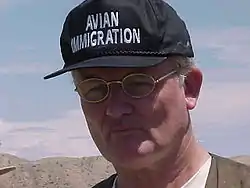Peter Pritchard
Peter Charles Howard Pritchard[1] (June 26, 1943 – February 25, 2020) was a leading turtle zoologist. Educated at Oxford University and the University of Florida, where he earned his Ph.D. in Zoology, he was most commonly known for his campaign of almost 40 years for the conservation of turtles.
Dr. Peter Pritchard | |
|---|---|
 | |
| Born | June 26, 1943 England |
| Died | February 25, 2020 (aged 76) |
| Alma mater | University of Florida Oxford University |
| Known for | Work for the Conservation of turtles |
| Scientific career | |
| Fields | Zoology |
| Institutions | Chelonian Research Institute |
He worked with the World Wildlife Fund, spending four years there before joining Audubon Florida in 1973 as assistant executive director, senior vice president and acting president. In 1997,[2] he founded the Chelonian Research Institute, for the study and preservation of turtles, in Oviedo, Florida, United States. Scott A. Thomson, curator of the Chelonian Research Institute notes that the CRI has 14500 tortoise and turtle specimens registered with some 2000 unregistered specimens. The collection comprises 100% of all turtle genera, 86% of all species and 72% of all subspecies - the third largest and most complete collection in the world.
Pritchard's most important and innovative work has been along the Atlantic coast of Guyana, the South American country that is home to four of the world's seven known sea turtle species: the leatherback, green, hawksbill and the olive ridley. By the 1960s, overhunting by local Arawak Indians — themselves an endangered group — had ravaged the turtle population. He also named several species of turtle for example Mesoclemmys zuliae and Chitra vandijki.
Pritchard lobbied Guyana and private sources for grants that lowered the Arawak consumption of turtle meat, and helped them to farm chickens. He hired Arawaks at his study camp to tag turtles for research and to police nesting grounds to prevent attacks from poachers. The turtle population has increased, he says, because turtle protection is now "a family discipline thing" among Arawaks "rather than an outsider laying down the law." Along the way, Pritchard's own scholarship has benefited from centuries' worth of tribal turtle knowledge. He has also done extensive study and written books about alligator snapping turtles and Galapagos tortoises.
Upon his death, Pritchard was survived by his wife Sibille, a Guyanese journalist,[3] and two sons.
Eponyms
Pritchard is honored in the scientific names of three turtles, Podocnemis pritchardi †,[4] Chelodina pritchardi and Mauremys pritchardi.[1]
References
- Beolens, Bo; Watkins, Michael; Grayson, Michael (2011). The Eponym Dictionary of Reptiles. Baltimore: Johns Hopkins University Press. xiii + 296 pp. ISBN 978-1-4214-0135-5. ("Pritchard", pp. 211-212).
- "Turtle conservationist Peter Pritchard dies at 76". Kaieteur News. 2020-02-27. Retrieved 2021-01-12.
- "Florida scientist Peter Pritchard, known as 'the Turtle God,' dies at 76". Tampa Bay Times. Retrieved 2021-01-12.
- Wood RC (1997). "Turtles". In: Kay RF, Madden RH, Cifelli RL, Flynn JJ (editors). Vertebrate Paleontology in the Neotropics. The Miocene Fauna of La Venta, Colombia. Washington, District of Columbia: Smithsonian Institution Press.
Further reading
- Sulloway, F.J. (2006). "Is lonesome George really lonesome?" Skeptic 12 (4): 58–70.
External links
- Environmental Science Program .
- Chelonian Research Institute official website of the Chelonian Research Institute in Oviedo, FL.
- TIME.com: Heroes of the Planet .
- Interview .